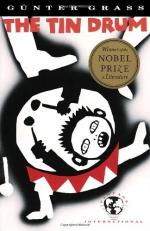|
|
The Tin Drum Chapter 27: Inspection of Concrete, or Barbaric...
The troupe started their tour, finally arriving in Paris in September. Oskar and Roswitha spent all their time together, admiring the Eiffel tower and exchanging kisses. Oskar compared the arching legs of the tower to his time under his Grandmother Anna.
Topic Tracking: Individuality/Identity 10
In Paris, Oskar upgraded his performance - instead of exploding beer bottles with his voice, he would destroy priceless pieces of blown glass from the French castles. He went chronologically through history, starting with the reign of Louis XIV, then Louis XV, then Louis XVI, and finally that of Louis Philippe. Only seldom did someone in the crowd of soldiers recognize this historical acumen. The troupe spent the winter in Paris - they stayed in first class hotels and Oskar and Roswitha spent their time comparing the beds together.
After performing inland, the troupe moved to the coast and was offered a tour of the Atlantic wall. They stayed with peasants and enjoyed the local wine. The next day, they went out to the pillboxes on the front line, where they met a man named Corporal Lankes. They begin talking to him. He tells Bebra that they build a live puppy into the concrete foundation of every pillbox they build. As Lankes' superior officer leaves, Roswitha, Oskar, Felix, and Kitty jump up on the pillbox and play. Bebra asks Lankes his profession; he says he is and artist, stylistically somewhere between Rembrandt and Velasquez. Lankes has decorated the entrance to the pillbox with his art; Bebra likes it very much. Lankes calls the decorations "Oblique Formations," but underneath the decorations in small letter it reads "Barbaric, Mystical, Bored." Bebra says to Lankes: "You have given our century its name." Chapter 27, pg. 337. On top of the pillbox, Oskar and Roswitha have written a poem, which they read to the group. After the poem is read, the troupe opens up a picnic basket full of breakfast and begins to eat on the concrete. They have foie gras, caviar, cookies, Dutch chocolate, ginger and plum preserves, boiled eggs, and corned beef. They offer some to Lankes, who eats with them.
In the distance on the beach, the group spies five umbrellas - it is a group of nuns, come to pick the shellfish stuck in the military installations on the beach. Sister Scholastica, an older nun, is looking for Sister Agneta, a younger nun who has run off and been lost in music that Roswitha has put on a gramophone. Lankes superior officer calls him on the telephone and orders Lankes to open fire on the nuns. He does so as the troupe listens to another record. Together, they mull over Lankes' art and the puppy bones that will be found in a thousand years when the pillbox is dug up.
That night, the troupe had two shows. At 5AM they awoke to the sound of the allied invasion. Canadians landed in the troupe's sector. During the evacuation, Roswitha asked Oskar to get her a cup of coffee at the field kitchen. Oskar refused, so Roswitha went to get it herself. She reached the coffee at the same moment that an allied naval shell hit the field kitchen. After receiving orders to go to Berlin, Bebra spoke of Roswitha's death. "'We dwarfs and fools have no business dancing on concrete made for giants. If only we had stayed under the rostrums where no one suspected our presence!'" Chapter 27, pg. 345
In Berlin, Oskar parted from Bebra, who gave him five drums as a present and had Felix and Kitty accompany him home. He arrived in Danzig on June 11, 1944, one day before Kurt's third birthday.




